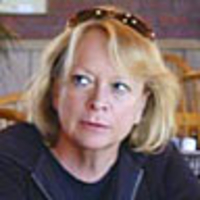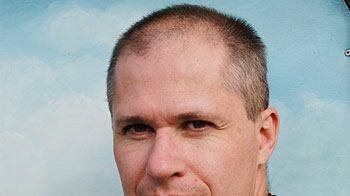
Aleksandar Hemon is a big guy (think soccer) with a strong voice. In person, the MacArthur Fellowship-winner is funny, in a dark, bluesy way. That sardonic voice propels his fiction, including the eight stories in his new collection, Love and Obstacles. The new stories are characterized by an invigorating approach to the English language, and an observant, knowing, and a sharp-tongued narrator, who, like Hemon, was born in Bosnia, lives in the U.S., and belongs nowhere. “I like to blur the line between fact and fiction, but not to condescend to the reader by enmeshing her/him into some sort of a postmodern coop,” Hemon says. “The way my imagination works is that I compulsively imagine alternative scenarios to the situations in my life.” And, he says, he sees life as “simultaneously funny and horrible.” (See his “The Noble Truths of Suffering,” part of The New Yorker’s winning entry for the 2008 National Magazine Award, here.)
“I imagine that [Obama] is able to see life from different points of view, which is what reading literature can train you to do. I’d rather have a reader in the White House than a decider.”
I first saw Hemon onstage during the 2008 PEN World Voices Festival Cabaret, reading from his novel, The Lazarus Project. The book is narrated by a Bosnian immigrant in present-day Chicago, and was a finalist for the National Book Critics Circle and National Book Awards. He read from the book at the Chicago Associated Writing Programs conference a few months ago. At dinner afterward it was clear he had developed a fan’s enthusiasm for Chicago.
No wonder. Hemon was stranded there in 1992, at the end of a cultural exchange program for journalists, when his hometown, Sarajevo, came under siege. He was granted political asylum. He couldn’t write in his native language. “War, trauma,” he says cryptically. So he taught himself English. By 1995 he had written the first story in his collection The Question of Bruno. His second collection, The Nowhere Man, was a finalist for the National Book Critics Circle award. (More on his Web site)
We reconnected in April, just before Hemon headed to Sarajevo for two weeks to launch the translations of The Lazarus Project and Love and Obstacles.
How is your work perceived in Sarajevo?
I wish I could avoid the people who have threatened me. My favorite threat is that I will be thrown in the River Miljacka, which is at most knee-deep, with my feet bound in cement. A lot of people there like my work, and even me, but there are those too who hate it, and me, few and far between though they may be. I’ve been writing a column in a Sarajevo magazine for the past 17 years and have, happily, pissed off a lot of people.

Could you explain some of the elements of Chicago that appeal to you?
I am at home in Chicago, to a large extent because I sought the things that I thought a hometown should have—a steady barber, a coffee shop where they know what I drink, a bar where you can talk to the owner, a history that includes you, friends, family, a large number of various complicated humans whose very presence prevents any kind of purity or prescriptive order, enough people to play and discuss soccer with.
You met your wife, Teri Boyd, in Chicago?
She was editing a book of photos about Chicago and wanted writers who live here to contribute. So our first meeting was a business meeting. Our daughter was born in Chicago, and she’s already showing it. The temperature has to be approaching zero for her to wear a hat.
When did you first hear about Barack Obama?
I went to an antiwar demonstration in 2003 and Obama had just finished his speech—I missed it—but the people were still trembling with excitement and the guy next to me said something to the effect of “He is going to be president one day.” He was a state senator at the time.
What has Obama’s presidency meant to you? To Chicago? To your family?
It’s fucking liberation. I don’t expect him to be perfect. In fact, I expect to find many of his decisions and policies objectionable. But I do not expect to feel as though I live under occupation—complete with daily humiliation and a constant sense of fundamental insecurity—which is how I felt during the eight years of the Bush fiasco.
Do you know Obama?
No, I don’t. But my wife’s cousin’s daughter went to school with Sasha and will be going to the White House for a slumber party sometime soon.
How do you feel about a fellow writer ascending to the presidency? How might his being a writer influence how he leads the U.S.?
Writing is not his vocation, politics is. I imagine that he is able to see life and reality from different points of view, which is what reading literature can train you to do. I’d rather have a reader in the White House than a decider. His decisions will not follow the models of narrative fiction—unless you apply that label to the CIA slam-dunk files—but the logic of retaining and expanding American power and maintaining capitalism.
Could you describe the close-knit Bosnian community in Chicago? It seems like a classic immigrant community.
There is a difference between an immigrant community and a refugee community. Most Bosnians in Chicago, and elsewhere in the U.S., came as refugees in the early '90s, with the help of relief agencies. I believe that leaving your home is a trauma unto itself, but it is different if it is a choice—however desperate—that you made. Most Bosnians in Chicago were expelled from their homes, because they were Muslim—it was not their choice. I remember talking to a Bosnian here not long after 9/11 and he was very troubled and angered by some radio shock jock who was ranting about nuking the “towelheads.” The possibility of being expelled again was looming for him, one way or another.
The Lazarus Project involves the 1908 shooting death of an immigrant. How has your own experience as a newcomer to the U.S. involved the American response to the “other,” the “foreigner?”
I have to say I have not been subject to prejudice, other than occasional condescension of the “You’re-so-articulate” sort….But the xenophobic madness after 9/11 that entranced a large number of Americans (many of whom now wish to forget all that) was crushing to me—Bush and his cohorts brought out the worst in Americans, and we are all still reeling from that. The madness was very close in kind, if not in degree, to the rabid Serbian nationalism that resulted in the mass murder of Muslims in Bosnia. The government of this country committed—repeatedly, in full view of everyone—horrendous war crimes. Now we’ve moved on, and airports and highways will be named after the scum, and we are once again a proud nation.
How has Chicago changed over the past century in terms of welcoming or resisting newcomers from other countries?
The funny thing about immigration in this country is that it is unstoppable. Despite all the resistance, people coming from elsewhere have been changing this country for a long time and it is going to keep happening. In the neighborhood I live in, about 120 languages are spoken, including English. The transformation is irreversible.
In “ Good Living,” your displaced narrator, who sells magazine subscriptions door to door, describes himself as “the living embodiment of the American dream.” Has that symbol attached itself to you?
The problem of the American Dream notion is that excludes those who experienced the American Nightmare. A large number of the people who came in through Ellis Island, went back home later. Some of them just wanted to make money and go home to spend it, others were just crushed by the brutality of American capitalism.
This country offers great opportunities and has a vitality—embodied in Chicago, for instance—that I love and find fascinating. But there is also the ruthlessness of exploitation, the xenophobia, the self-centeredness. This is a complicated country—the complications are awesome and God-given to writers—and I think that reducing the life in this country to the simple story of redemption through hard work does injustice to all those who have suffered and are still suffering here.
Plus: Check out Book Beast, for more news on hot titles and authors and excerpts from the latest books.
Jane Ciabattari’s work has appeared in The Guardian online, The New York Times, Los Angeles Times, Washington Post, Columbia Journalism Review, among others. She is president of the National Book Critics Circle and author of the short-story collection Stealing the Fire. Recent short stories are online at KGB Bar Lit, Verbsap, Literary Mama and Lost Magazine.






